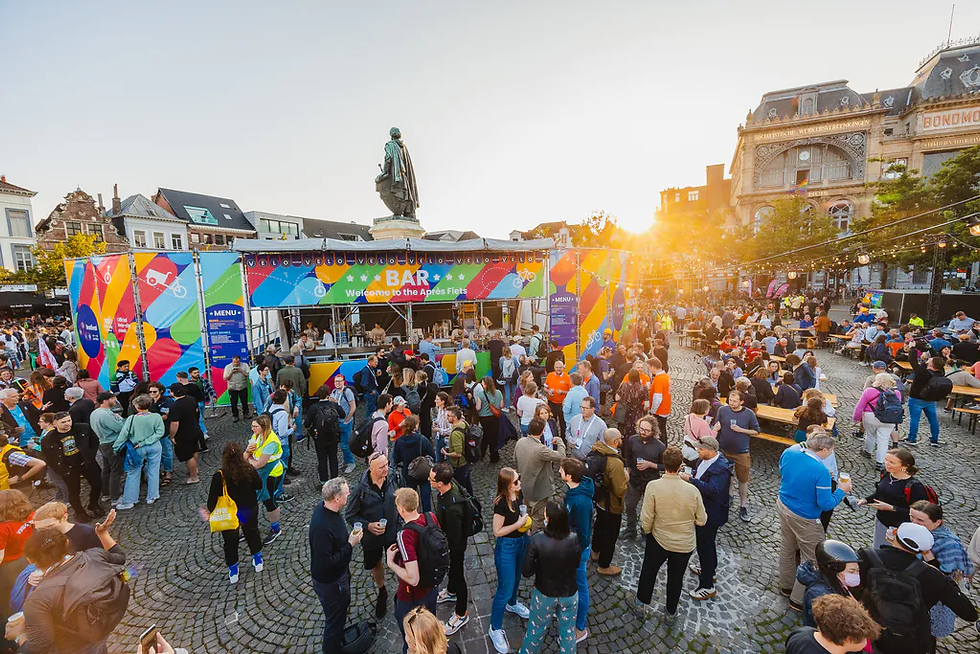Velo-city Ghent — Day 3: A ride on the Cycling Highway, then deep dives on logistics and the bigger picture
- David Everard

- Jun 19, 2024
- 3 min read
Afternoon on two wheels.
We used Day 3 with friends from Luxembourg, to roll out along Ghent’s Cycling Highway. It’s the kind of ride that explains itself: wide where it needs to be, legible at the tricky bits, and stitched into places people actually want to go. We traded notes the whole way—what makes a link feel “effortless,” where wayfinding carries you through, how crossings either invite you or make you hesitate. Field time like this keeps our desk work honest.

We only skipped one session for the ride—and then went straight back in. The morning turned into a mini-masterclass on urban logistics and a wide-angle plenary on why cycling futures don’t start with cycling alone.
Cargo bikes, micro-hubs, and what the numbers say
Several talks pulled real data, not just good vibes. Brussels’ cycle-logistics cooperative urbike shared a head-to-head with parcel vans across 7,340 deliveries / 907 routes: cargo bikes took more direct routes, delivered more parcels per hour both on the move and while parked, and reinforced the simple rule—use each vehicle where it performs best. It’s not ideology; it’s operations.

bpost walked through their Ecozone model (micro-hubs, lockers/PUDO, e-vans where needed, cargo bikes by default). In Mechelen, a VUB evaluation showed up to –97% CO₂ vs. business-as-usual delivery, with knock-on drops in congestion, noise, and other external costs. Scaling is underway toward the biggest Belgian cities, built on a mix of consolidation and genuinely walkable pick-up networks.
From Stockholm, a small idea with big ripples: a cargo-bike patrol that fixes the little things fast—glass, signage, winter debris—so daily riding stays pleasant. It started as a pilot, became permanent within a year, and earned rare public comments like “double the budget.” Low-cost, high-impact, and a good nudge for any city team.
Zooming out, CIE / Belgian Cycle Logistics Federation mapped how to mainstream cycle logistics: show the performance, standardise space for cargobikes at the curb, and publish a knowledge atlas so municipalities can copy quickly. The message landed: where cargo bikes and micro-depots fit the task, they win—on cost, time, and streets people enjoy.

Practical kit: space, charging, security
Designers reminded us that cargobikes need places to be. ARUP’s framework walks through user types (shop owners, service technicians, parcel riders) and what that means for loading zones, breaks, charging, and secure overnight—then shows how to redraw a typical shopping street so those needs don’t fight with pedestrians. It’s refreshingly specific.
Two startup pitches rounded out the “friction” story. TILER’s inductive charging tiles tidy up hubs (no cable spaghetti) and cut battery-swapping costs for shared e-bike fleets; the pilots in NL/BE/DE are promising where operators carry the right kickstand. Velopass pushes a digital bike ID across shops, insurers, and cities, with a reported 5× higher recovery chance when theft happens. Both are small pieces that make the everyday system work better.

Plenary: cycling as part of a living system
The closing lens was wide. Prof. Meredith Glaser framed mobility as a complex, socio-ecological system: policy, power, culture, street experiments, and empowerment all matter, often more than the object “bicycle.” We recognised Ghent in that mirror—years of “living street” trials, iterative learning, and a habit of sharing results in public. It’s a good compass for any city (and any consultant): mind the system, not just the scheme.
What we’re bringing home.
A morning ride to remember what “good” feels like; an afternoon of proof that cargo bikes + micro-hubs aren’t a niche but a tool you can scale; and a reminder that the most durable cycling gains start outside cycling—in how a city listens, designs space, and fixes small things fast. That’s exactly the mix we love to bring to client work: field sense, clear metrics, and practical steps you can pilot next month.






Comments